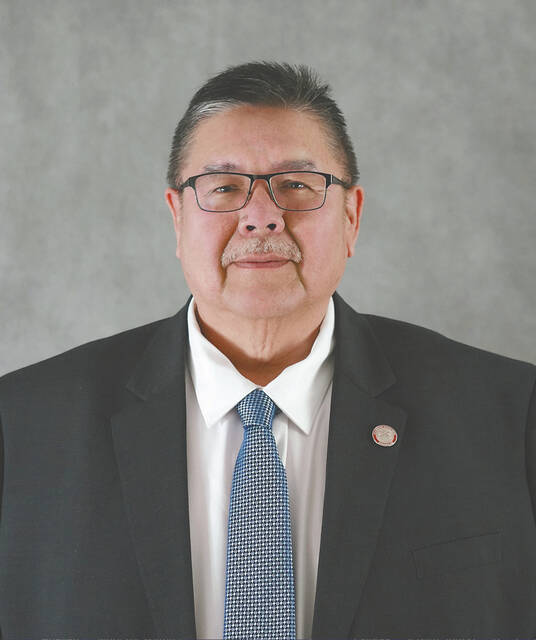A conversation with United Tribes Technical College President Leander McDonald
If there’s a keyword to describe the tribal nations of North Dakota and one of its foremost colleges, it might very well be “progress.”
Among that broad definition is higher school retention rates among students, and more connectedness with the state and federal governments, according to Dr. Leander McDonald, president of United Tribes Technical College.
Recently, McDonald shared with the Devils Lake Journal some of the hot topic issues he’s seeing at the college and noticing among the tribes.
A college for all
McDonald has been president of the United Tribes Technical College, located in Bismarck, since 2014. Although based in the state’s capital city, the school serves tribal students across North Dakota, including many in the Devils Lake area. He is proud of the school’s history, its legacy, and what it continues to accomplish for tribal students across the state.
“It’s the second tribal college in the nation and was founded by the four tribes in North Dakota in 1969,” McDonald said, noting the Sisseton tribe, on the North Dakota-South Dakota border, joined the consortium five years later.
Originally known as the United Tribes Educational Training Center at the time of its founding, the school aimed to address workforce issues for the tribal nations – basically getting people into entry level positions such as cooks, maintenance workers, automotive training and the like; but eventually work evolved to the level of post-secondary education. The Higher Learning Commission accredited the school in 1982.
“We’ve been accredited ever since,” McDonald said. “We’re one of the only colleges in the nation that is accredited for all of our programs of study to be offered online.” This was a boon during the height of the COVID-19 pandemic. “When the pandemic hit, we were already accredited to that end, so we didn’t have to seek permission to move online like a lot of other colleges did. I think that was a positive during that negative time.”
Now that technology has progressed to the level of artificial intelligence, McDonald said the school is exploring the possibilities of how AI can benefit instructors and students alike. He also said the school’s retention rate of students has been positive.
“We’ve been in business since 1969, so for 56 years, and we continue to advance ourselves,” he said. “What I’ve seen during my time here is that we’re experiencing higher persistence rates, from fall to spring semester; higher retention rates, from fall to fall; and higher graduation rates as a result of those other two higher rates.”
The college had its accreditation visit from the Higher Learning Commission in March, and the school “did very well,” McDonald said. “We continue to maintain our accreditation and things are going well in that direction.”
At the time UTTC was founded, McDonald said there were no other tribal colleges in the state. Since then, however, each of the tribes that govern the college founded their own tribal schools, including Spirit Lake, which established the Candeska Cikana Community College, also known as Little Hoop, in Fort Totten.
“They’ve been in existence a little over 50 years, too,” McDonald said. “They’re doing very well in regard to education and culture-based curriculum for the students that are primarily from the Spirit Lake reservation.”
He said there is a close partnership with all the tribal colleges in the state through the North Dakota Tribal College System.
Budget nerves
Bringing education to the tribes, however, has not been without its challenges.
Earlier this year, the Trump administration proposed cutting funding for tribal colleges and universities by nearly 90%, a move that sent shock waves through the tribal schools.
“That would have been devastating to all of us,” McDonald said.
The tribes went to Congress to seek help. One motion was to pass a budget higher than the previous year; another was to keep it at the same level. “So that’s kind of where we’re at now,” he said. “The budget hasn’t been approved, but we’re hopeful that what’s being proposed … will fall somewhere in the middle so that those funds can move forward from there.”
Looking ahead
McDonald, who at one time served as chairman of the Spirt Lake Nation, briefly recapped history’s unnerving past when the U.S. government took land from the native tribes. He said relations with the government, both state and federal, have a come a long way and continue to progress – although there is still much that needs to be done.
“I continue to be optimistic,” McDonald said. “I think as long as we’re maintaining those relationships and putting forth our issues in the form of input, not only verbally but also in written testimony, I think we’ve done our part in what the needs are of the tribal nations. … I think if each of the tribes are doing that, then there’s got to be some themes coming out of their testimonies that help give direction on what the tribal constituencies’ needs are, both at the state and federal levels. The governor is listening, and so is the legislature. … The same thing can be said at the federal level for our North Dakota obligation.”
He appreciates the efforts of North Dakota Sens. Kevin Cramer and John Hoeven, both Republicans, the latter who seems to know all of the tribal leaders. “He knows what the needs are, and so having that ongoing relationship with the tribes, I think, has been helpful,” McDonald said.
The college president, who respectfully shares his hopes for the tribal nations, said he looks forward to the continuing work of his school in furthering opportunities and hope across the state. As the tribal nations work independently and together in their shared values, there is no reason to be other than optimistic.
As an example, when asked if relationships with the government are better today than they were even five years ago, he said: “It feels positive,” but explained that the individual tribes “have to manage their resources well, live within their means, and make sure they have some type of reserve in case something comes up. That just makes sense for a variety of entities, whether you’re a tribe or a college or it’s your personal bank book. I think there’s some basics there that we all understand and that can be applied with regards to what good management is.”





